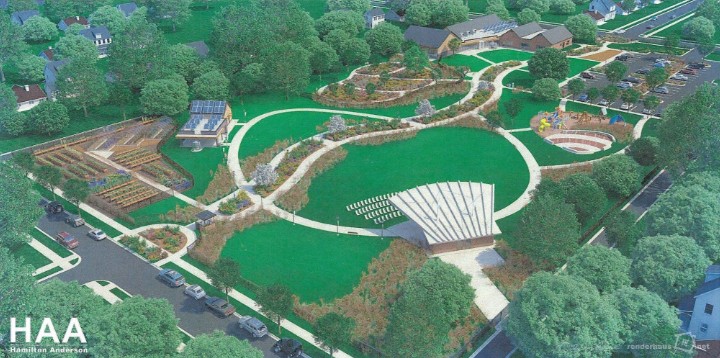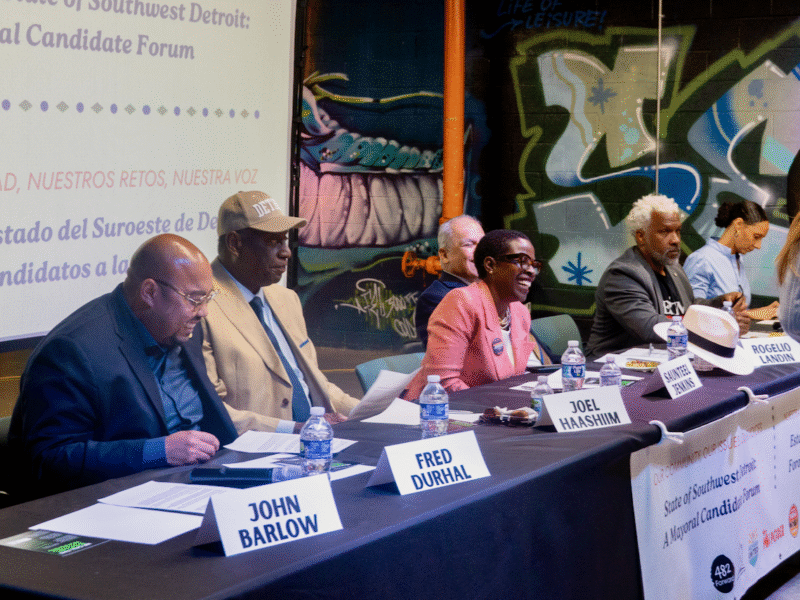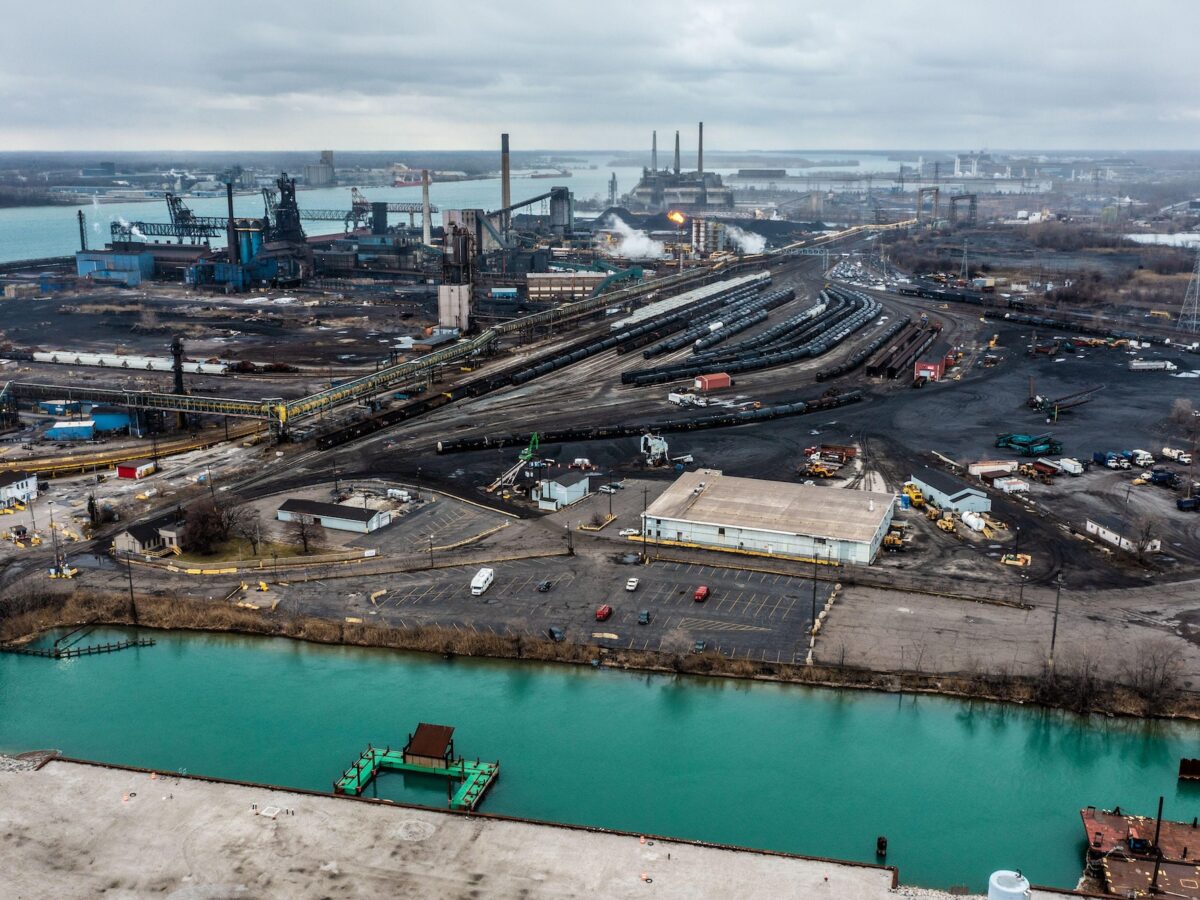Overview:
-A $21 million project on the former site of Mark Twain Elementary School brings vision of health and wellness to an area burdened by pollution.
-Eden Park is a project of the Tri-City Community Development Corporation, a 25-year-old nonprofit empowering residents of Southwest Detroit, River Rouge, and Ecorse.
-A $2 million settlement between the Sierra Club and DTE Energy funded environmental justice projects in the tri-cities area.
If you look across Gleason Street from the New Mt. Hermon Baptist Church in Detroit’s 48217 ZIP code, you’ll see an empty, grassy field. The church’s pastor, Rev. Dr. Alex Hill, and residents see much more: the $21 million Eden Park Community Project.
Their vision calls for a walk through a great lawn with large “mechanical trees” that remove 1,000 times more carbon dioxide than normal trees. To the left are abundant vegetable and botanical gardens, and to the right is an amphitheater, playground, and splash pad. At the end of the park, people with Alzheimer’s and their caretakers take a break in a lush, secured area, and children attend Montessori school in the community house.
This is the vision residents have for the nearly 6-acre lot on the former Mark Twain Elementary School site. The project is a long time coming, said Dr. Alicia Renee Farris, co-chair of Eden Park Steering Committee and board treasurer for the Tri-City Community Development Corp.
“Residents haven’t seen this level of investment in years,” Farris said. “Most of it has been new corporations being a part of the problem, not necessarily solution-based community development.”
In Southwest Detroit, vehicle and industrial pollution from both sides of the Detroit River is an everyday problem for residents, taking a toll on their health and quality of life. Through clean energy alternatives like stormwater management, solar panels, and a parking lot with EV chargers, Farris said she hopes Eden Park will mitigate the damage from industrial pollution.
‘Tranquil’ vision for Eden Park
The project will provide direct access to resources to support health and wellness, Farris said, like a resiliency hub with utility assistance, food and clothing during power outages, and a community garden.
The Eden Park plans call for a 2,000-square-foot pavilion and a 1,300-square-foot amphitheater, according to a project outline. The plans include a veterans memorial and community programming and resources targeting youth and seniors.
This programming will take place at a two-story “Community House” with a Montessori school, a computer literacy center, and a resilience hub. Eden Park will offer workshops for doctors to “better understand the conditions in which their patients live,” Farris said.
Eden Park is a place to promote health and wellness, rather than a recreational area, she said.
“We do not want to compete with the Kemeny Recreation Center. We want this to be a tranquil surrounding,” she said.
The concept for a gated Alzheimer’s park, accessible through the community house, was designed with help by the University of Michigan Alzheimer’s Disease Center, and includes calming features such as gardens, Farris said.
Eden Park is a project of the Tri-City Community Development Corporation, a 25-year-old nonprofit empowering residents of Southwest Detroit, River Rouge, and Ecorse through youth and senior programming, opportunity training, and a family resource center.
The project established a green infrastructure task force in 2017, and the nonprofit acquired the property in 2019, Farris said. The COVID-19 pandemic slowed progress, Farris said, though Eden Park held a ceremonial groundbreaking in 2022.
The Eden Park backers plan to begin construction in 2026, and it will take about a year, Farris said.
MORE PLANET DETROIT REPORTING
Southwest Detroit mayoral forum highlights public health, immigration
Southwest Detroit residents raise ongoing issues from February’s water main break and health impacts from truck traffic. Candidates promise action to help an area they say has been neglected.
Michigan regulators approve air pollution permit for Zug Island coke facility
Michigan regulators greenlight permit for a coke screener at DTE Energy-owned EES Coke Battery on Zug Island.
Balancing safety and community in Southwest Detroit: Lessons from Clark Park’s revitalization
In Southwest Detroit, Clark Park stands as a testament to community resilience, evolving from a site of drug activity and violence into a vibrant neighborhood hub. This transformation, driven by grassroots initiatives and city collaborations, highlights the power of community-centered policing, though it sparks debate over police roles in public spaces.
$20M fundraising goal for Southwest Detroit development
At first, Farris said the plans for the park were simple. The funding goals for the project spiked from $2 million to $20 million once residents’ voices were heard, she said: they asked for a community house with programming, a picnic pavilion, secure spaces, and gardens.
“The $2 million originally projected would have been just a park in the midst of 42 polluting entities,” Farris said.
The project has raised 6% of the approximately $21 million goal, with $20 million left to raise, Farris said. The community development corporation’s fundraising campaign is called Ten Bring $Ten. Someone donates $10, and asks 10 people to donate $10, New Mt. Hermon’s Hill said.
“It takes a lot of people, but a lot of people do a little,” Hill said. “By doing it this way, it’ll not only make it reasonable for people to donate, but it also gives them an opportunity to be vested in the project itself.”
Farris said Eden Park’s revenue streams will include farmers’ markets; a day care center; and event rental spaces for residents, nonprofits or corporations, including the community house, amphitheater, and pavilion.
The project applied for the Environmental Protection Agency’s community change grant in November 2024, Farris said. The program, a nearly $1.6 billion historic investment in environmental justice under the Inflation Reduction Act, aimed to advance local projects that reduce pollution, increase community climate resilience, and build community capacity.
In Michigan, six projects were awarded community change grants in December 2024, ranging from $3 million to $20 million. Under the Trump administration, all projects have been at a standstill since early May, Bridge Michigan reported.
Eden Park never received a formal rejection letter, Farris said, adding that the EPA responded suggesting the group look for other funding options.
The only project in Detroit awarded a grant, EcoWorks, a Detroit-based nonprofit awarded $20 million in December, had planned to transform houses of worship into community resilience hubs powered by solar energy. Its work is now stalled, as Planet Detroit previously reported.
An environmental assessment of the Eden Park site found arsenic, selenium, and zinc, Farris said. Though not mandated by an environmental agency, the project’s backers decided to “do their due diligence,” Farris said, and remove 2 feet of soil beginning this fall. The remediation will cost about $1 million, and Farris said she hopes it will be funded through the Ten Bring $Ten campaign.
Environmental justice projects in the tri cities were funded by a $2 million settlement between the Sierra Club and DTE Energy signed in 2020, ending a “decade-long dispute over the utility company’s alleged Clean Air Act violations,” The Detroit News reported.
The settlement contributed $500,000 for Eden Park, Farris said, and the funds were used for architectural design, pre-construction activities, and community engagement efforts.
“We intend to make sure that everyone is feeling very safe and comfortable, and there’s something for all ages,” Farris said.
Editor’s note: This story has been corrected to remove an erroneous reference to a state environmental assessment and an error regarding the funding of environmental remediation at the Eden Park site.





